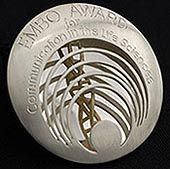Compugen Leads Consortium to Model Cancer Related Kinase Pathway
European Commission to Fund SIMAP Consortium
Compugen Ltd. announced that it is leading a consortium for the development of a platform to simulate the MAP-kinase pathway, a signaling pathway related to cancer which is already targeted by a number of cancer therapies and diagnostic tests.
The Simulation Modeling of the MAP-kinase Pathway (SIMAP) consortium is funded by the European Commission which has allocated 3.1 million Euro for the project over a three year period. In addition to Compugen, the consortium includes Aureus Pharma of France, Consejo Superior de Investigaciones Científicas of Spain, the Institut De Recerca Hospital Universitari Vall De Hebron from Spain, Istituto Nazionale Tumori of Milan-Italy, the Max Planck Institute for Infection Biology from Germany, the University of Glasgow from the UK, the Weizmann Institute of Science from Israel, and Arttic Israel, a consultancy and management company.
The MAP-kinase pathway is a major pathway that relays signals from the plasma membrane into the nucleus. A deep understanding of this pathway is important for the development of rational anti-cancer therapies. The SIMAP consortium intends to develop a comprehensive and robust simulation model of the pathway, which will incorporate data from the literature, as well as experimental and clinical work. The model is expected to create qualitative predictions, followed by experimental verification. It is expected to integrate and analyze data from various types of resources ranging from single molecule information, to pathway modeling, to clinical data and patients' response.
This approach is expected to enable hypothesis-driven research aimed at the establishment of systems level computational platforms available for various pharmaceutical applications. The concepts and methods intended to be developed could help in the design of new therapeutic drugs, decrease the attrition rate of new drugs and make it possible to select patients for treatment on the basis of individual parameters. Model-driven predictions regarding the impact of drug combinations could allow dramatic improvement in the design of pre-clinical and clinical trials, enhance patient response and limit adverse effects of drugs.
Organizations
Other news from the department science

Get the life science industry in your inbox
By submitting this form you agree that LUMITOS AG will send you the newsletter(s) selected above by email. Your data will not be passed on to third parties. Your data will be stored and processed in accordance with our data protection regulations. LUMITOS may contact you by email for the purpose of advertising or market and opinion surveys. You can revoke your consent at any time without giving reasons to LUMITOS AG, Ernst-Augustin-Str. 2, 12489 Berlin, Germany or by e-mail at revoke@lumitos.com with effect for the future. In addition, each email contains a link to unsubscribe from the corresponding newsletter.
Most read news
More news from our other portals
Last viewed contents
Call for entries: Eppendorf Award 2016!
Chemists report nicotine-chomping bacteria may hold key to anti-smoking therapy

SIRS-Lab appoints Ed Currie as Executive Vice-President, Corporate Development



















































